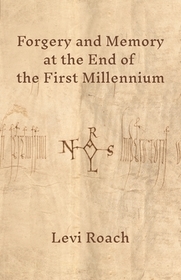
Forgery and Memory at the End of the First Millennium
-
10% KEDVEZMÉNY?
- A kedvezmény csak az 'Értesítés a kedvenc témákról' hírlevelünk címzettjeinek rendeléseire érvényes.
- Kiadói listaár GBP 45.00
-
21 498 Ft (20 475 Ft + 5% áfa)
Az ár azért becsült, mert a rendelés pillanatában nem lehet pontosan tudni, hogy a beérkezéskor milyen lesz a forint árfolyama az adott termék eredeti devizájához képest. Ha a forint romlana, kissé többet, ha javulna, kissé kevesebbet kell majd fizetnie.
- Kedvezmény(ek) 10% (cc. 2 150 Ft off)
- Kedvezményes ár 19 349 Ft (18 428 Ft + 5% áfa)
Iratkozzon fel most és részesüljön kedvezőbb árainkból!
Feliratkozom
21 498 Ft

Beszerezhetőség
Becsült beszerzési idő: A Prosperónál jelenleg nincsen raktáron, de a kiadónál igen. Beszerzés kb. 3-5 hét..
A Prosperónál jelenleg nincsen raktáron.
Why don't you give exact delivery time?
A beszerzés időigényét az eddigi tapasztalatokra alapozva adjuk meg. Azért becsült, mert a terméket külföldről hozzuk be, így a kiadó kiszolgálásának pillanatnyi gyorsaságától is függ. A megadottnál gyorsabb és lassabb szállítás is elképzelhető, de mindent megteszünk, hogy Ön a lehető leghamarabb jusson hozzá a termékhez.
A termék adatai:
- Kiadó Princeton University Press
- Megjelenés dátuma 2021. március 5.
- Kötetek száma Print PDF
- ISBN 9780691181660
- Kötéstípus Keménykötés
- Terjedelem360 oldal
- Méret 234x155 mm
- Nyelv angol
- Illusztrációk 52 b/w illus. 4 tables. 3 maps. 142
Kategóriák
Hosszú leírás:
An in-depth exploration of documentary forgery at the turn of the first millennium
Forgery and Memory at the End of the First Millennium takes a fresh look at documentary forgery and historical memory in the Middle Ages. In the tenth and eleventh centuries, religious houses across Europe began falsifying texts to improve local documentary records on an unprecedented scale. As Levi Roach illustrates, the resulting wave of forgery signaled major shifts in society and political culture, shifts which would lay the foundations for the European ancien régime.
Spanning documentary traditions across France, England, Germany and northern Italy, Roach examines five sets of falsified texts to demonstrate how forged records produced in this period gave voice to new collective identities within and beyond the Church. Above all, he indicates how this fad for falsification points to new attitudes toward past and present—a developing fascination with the signs of antiquity. These conclusions revise traditional master narratives about the development of antiquarianism in the modern era, showing that medieval forgers were every bit as sophisticated as their Renaissance successors. Medieval forgers were simply interested in different subjects—the history of the Church and their local realms, rather than the literary world of classical antiquity.
A comparative history of falsified records at a crucial turning point in the Middle Ages, Forgery and Memory at the End of the First Millennium offers valuable insights into how institutions and individuals rewrote and reimagined the past.
"There are few scholars who can match Roach’s range and the result is impressive, based on deep familiarity both with primary materials and previous scholarship."---Kathryn A. Lowe, History Today Több




